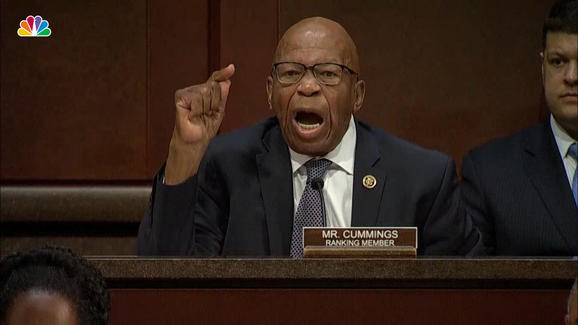Cummings is right: ‘We are better than this’
BALTIMORE – Elijah Cummings believes in America in spite of an America he’s known his whole life. The Democratic congressman out of undernourished West Baltimore told the whole country his feelings this week, when he wrapped up the Michael Cohen blood-letting on Capitol Hill.
Cummings told us “We’re better than this.” He’s repeated this line enough times now that it’s becoming a kind of anthem. When he says it, in his big, stentorian tones, the blood stirs. When he said it last week, at the House Oversight Committee hearing he chaired, it felt like a national call to arms after seven hours of allegations about the president of the United States selling out his own country.
“We’re better than this,” Cummings repeated. “We really are. As a country, we are so much better than this…When we’re dancing with the angels, the question will be, ‘What did we do in 2019 to keep our democracy intact? Did we stand on the sidelines and say nothing?’”
Better than this, indeed. The Democrats went for Donald Trump’s throat, and the Republicans went for Cohen’s. Cohen called the president a racist and a con man and a cheat. The Republicans called Cohen a liar, which he readily admits, and Cohen called Trump a liar, which almost everybody admits.
“The Washington Post says the president has made 8,718 false statements,” Cummings said. “That’s stunning. That’s not what we teach our children.” Staring directly at Cohen, he said, “The president called you a rat. Come on, we’re better than that.”
We have to get back to “normal,” Cummings said. He was calling on Americans’ better angels. After a dispiriting day, he was trying to put behind us for a moment all images of hush money to porn stars, and bank fraud and tax fraud and a rigged presidential election. For nearly 10 minutes, Cummings was a small-part politician, large-part preacher.
And yet, for Cummings, so much of his life has shown “normalcy” in America as a raw deal for people of color, a stacked deck against those reaching for simple fairness. He espouses idealism in spite of what he’s seen.
Cummings grew up in South Baltimore’s tough Sharp-Leadenhall neighborhood. His early schooling was racially segregated. On Labor Day, 1962, when Cummings was 11, he got a taste of how much white people in nearby Federal Hill were thrilled at the prospect of integration.
He was one of a couple of dozen black kids sponsored by the South Baltimore Recreation Center to peacefully integrate the neighborhood “public” swimming pool at Riverside Park. There were about a thousand whites there. Their immediate response to the black kids was screaming and cursing. Then it got seriously nasty.
Some of the whites had a dark-skinned doll, which they proceeded to stomp on. Then, in case the black kids didn’t get the message, some of the whites started throwing rocks and bottles. One of the bottles clobbered young Cummings in the head. It took a hundred city cops and two dozen K-9 dogs to calm things.
Cummings’ parents grew up in the south, where they were sharecroppers. When they moved to Baltimore, both became preachers of the gospel. Cummings’ father made his living at a chemical company, where he had to put up with the routine racist crap.
When he came home each evening, he sat in his car for a long time, just to blow off the frustrations and anger lingering in his system. As Cummings characterized it, his father didn’t want to bring the bitterness of the day into the home.
As a U.S. congressman, Cummings still hasn’t left impoverished surroundings. He lives in a West Baltimore neighborhood shadowed by crime and drugs. He’s been held up at gunpoint. His home has been burglarized, his car was broken into more than once. But these are his constituents, and he understands their desperation.
So, when he tells us, “We’re better than this,” Cummings is really uttering a kind of prayer, more than a precise expression of his own life experience. We want to believe what he’s telling us. At least we know we’re better than the mess we see in Washington today.

Michael Olesker, columnist for the News American, Baltimore Sun, and Baltimore Examiner has spent a quarter of a century writing about the city he loves.He is the author of several books, including Michael Olesker’s Baltimore: If You Live Here, You’re Home, Journeys to the Heart of Baltimore, and The Colts’ Baltimore: A City and Its Love Affair in the 1950s, all published by Johns Hopkins Press.


Hes a camera whore , hes the narcisit, he doesn’t turn on his party knowing what they have done or doing . when i needed help he blew me off just like Sarbanes kids. I slaved over multople jobs to get a house build up sewat equity but they sided with banks , lost my house and other equity too. Hes like the view , one sided . never looking both ways , hope the other bus clocks him when hes not looking. I have no respect for him.